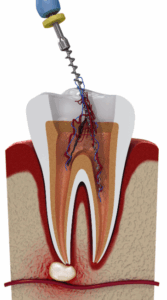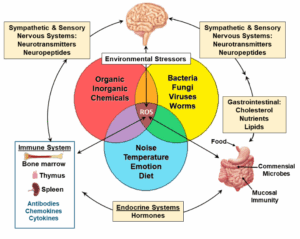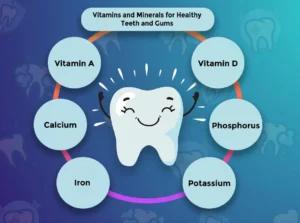Most of us don’t really spend much time thinking about our dental health – until we’re in the chair, staring down the barrel of a root canal.
Root canals are actually one of the most common procedures in modern dentistry, and for decades, it’s been considered a safe and standard treatment for infected teeth.
But in recent years, the root canal has come under fire. Some doctors, functional dentists, and biohackers now claim that root canals may contribute to a range of systemic health problems, from chronic fatigue to autoimmune disorders and even cancer.
So what’s the deal? Is this a legitimate concern, or just another fringe wellness rabbit hole?
Let’s dig into the science, the controversy, and what men need to consider when it comes to root canals and long-term health.
What Is a Root Canal, Exactly?
A root canal is a procedure that removes infected or inflamed pulp – the soft tissue inside your tooth – and replaces it with a filling material to preserve the outer shell. The goal is to save the natural tooth, avoid extraction, and eliminate pain and infection.
tissue inside your tooth – and replaces it with a filling material to preserve the outer shell. The goal is to save the natural tooth, avoid extraction, and eliminate pain and infection.
It sounds straightforward. And for millions of people, root canals provide quick relief and let them chew, smile, and talk without discomfort.
But here’s where the controversy begins: the tooth is still dying. Even after it’s filled, tiny tubules inside the dentin may still harbor bacteria – and that’s exactly what the anti-canal folks say causes long-term problems.
The Infection Argument
Critics of root canals, including some biological dentists and wellness practitioners, argue that the procedure creates – or rather masks and allows for the continuation of – a lasting low-grade infection in the body. While the pain is gone, anaerobic bacteria trapped inside the tooth structure may continue to multiply, releasing toxins that leach into the bloodstream.
This could, in theory, lead to:
- Chronic immune activation
- Fatigue and brain fog
- Cardiovascular strain
- Increased risk of inflammatory conditions
Some link root canals to more serious health issues, including:
- Heart disease
- Cancer
- Rheumatoid arthritis
The claim is that this “silent infection” burdens the immune system and creates systemic inflammation, especially in men already dealing with stress, poor diet, or environmental toxins – AKA most men.
What the Mainstream Says
The American Association of Endodontists (AAE) and the ADA (American Dental Association) strongly reject these claims. According to conventional dentistry, there’s no scientific evidence that root canals cause chronic illness or increase your risk of disease.
They point to decades of research showing the procedure is safe, effective, and vastly better than leaving an infected tooth untreated.
So who’s right?
A Middle Ground: Bioindividual Risk
The truth, like many things in health, likely lives somewhere in the gray. Not everyone who gets a root canal ends up with chronic fatigue or autoimmune disease. But for some guys, especially those with:
- Pre-existing gut issues

- Mercury fillings
- High EMF exposure
- Poor detox capacity
- General struggles with environmental stressors
…the added burden of a potentially infected, non-living tooth might be enough to tip the body into dysfunction.
This is the idea behind biological dentistry, which views the mouth as inseparable from the rest of the body. Biological dentists often avoid root canals entirely, preferring extraction followed by ceramic implants, bridges, or partial dentures – especially if systemic symptoms are present.
The Root Cause Perspective
Some health experts tie the root canal debate to mineral imbalance and oxidative stress. They argue that a well-mineralized, resilient body can handle bacterial exposure, but a depleted one can’t detox the toxic byproducts as effectively, leading to long-term immune issues.
If you’re run-down, inflamed, or constantly pushing through with stimulants and poor sleep, your threshold for handling chronic stressors, like a root canal, might be lower than you think.
The EMF + Infection Link
Emerging research suggests that electromagnetic fields (EMFs) may exacerbate bacterial behavior since they have indeed been shown to affect behavior in general. Some studies show EMFs can increase pathogen virulence and disrupt cellular communication – especially in tissues under stress.
For men with metal implants, root canals, or heavy exposure to Wi-Fi, Bluetooth, and 5G, this may represent another layer of strain. While more research is needed, it’s worth considering how these hidden environmental stressors interact with oral infections and our bodies’ ability to manage stress in general.
Supporting Resilience with Aires

To counteract this, we’re seeing an increasing number of athletes and health-conscious folks turning to Aires, which offers devices designed to reduce EMF-related biological stress. Aires products aim to harmonize electromagnetic signals and, in turn, ease the burden on your nervous system and support cellular recovery. Supporting your body in every way possible is especially important after an invasive procedure like dental surgery or when dealing with any strain on the system.
So, What Should You Do If You’re Told You Need a Root Canal?
If your dentist recommends a root canal, here’s a checklist to run through:
- Ask Questions. What alternatives are available? Is the tooth restorable in the long term, or is this a patch job?
- Get a Second Opinion. Especially from a biological or holistic dentist who can assess oral-systemic risk.
- Consider Your Health History. If you have chronic fatigue, Lyme, autoimmune issues, mold illness, or unexplained inflammation, proceed with caution.
- Upgrade Your Recovery. Whether you go through with the root canal or
 choose extraction, support your body with:
choose extraction, support your body with:
- Anti-inflammatory nutrition
- Hydration and minerals
- Red light therapy for immune modulation
- Sleep hygiene and stress management
Long-Term Thinking in Men’s Health
Dental choices aren’t just about saving a tooth – they’re about saving yourself from years of unexplained symptoms. For men focused on peak performance, biohacking, and functional health, it’s critical to treat oral health as an extension of whole-body health. That means tracking symptoms, asking hard questions, and viewing every procedure through a long-term lens, not just short-term convenience.
Conclusion: Don’t Ignore the Mouth
Men tend to neglect dental health, like many other health issues, until it becomes a crisis. We need to shift into the understanding that our mouths are a fundamental part of our body, not a separate system. Root canals can be helpful tools in certain circumstances – supposedly – but they’re certainly not without risks, and they deserve more scrutiny than most patients give them.
Think holistically. Ask deeper questions. And if you’re facing a decision about a root canal, make sure you’ve looked beyond the tooth – and at the bigger picture of your total health.



 choose extraction, support your body with:
choose extraction, support your body with:





